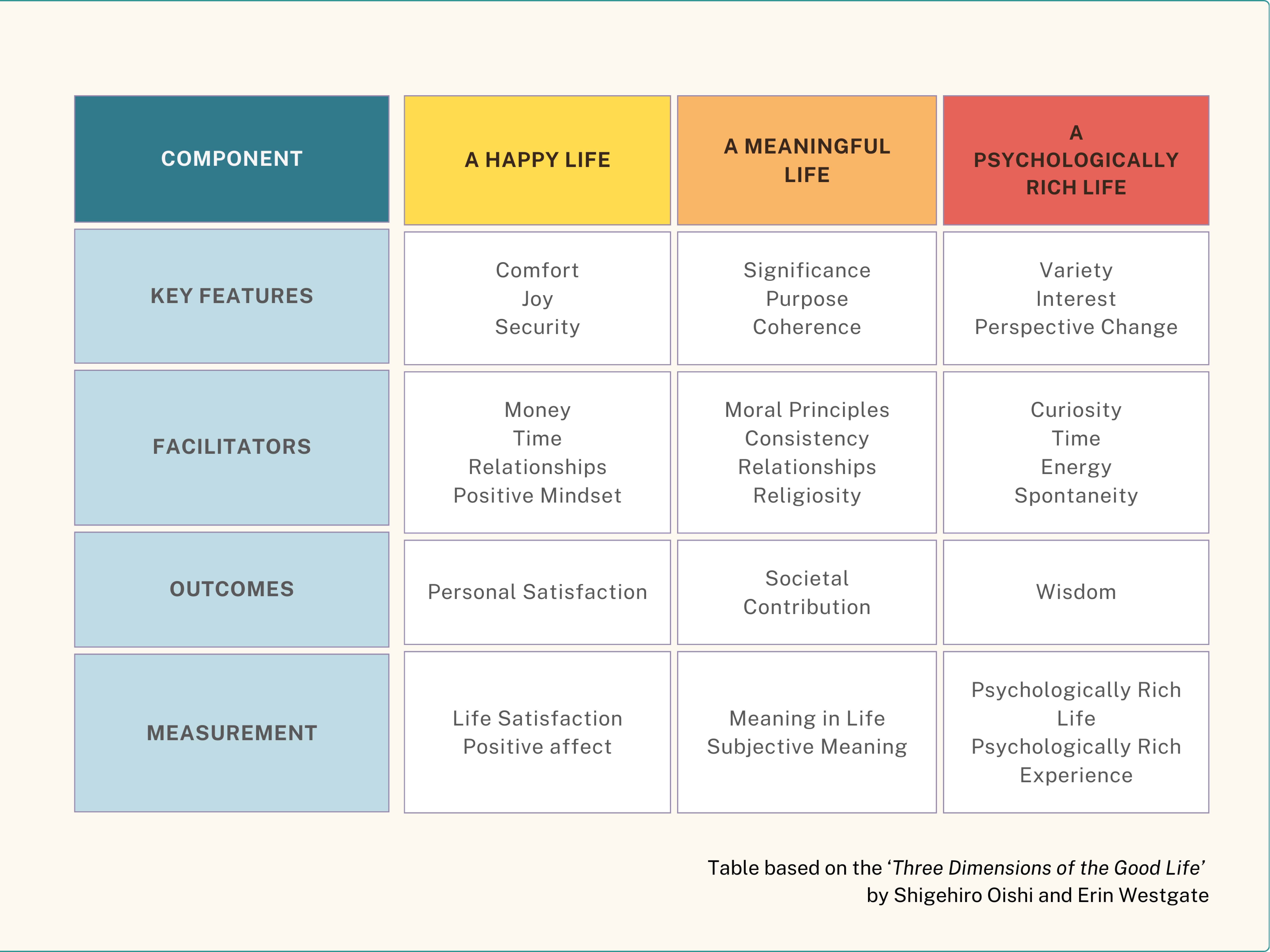I was sitting in front of my Zoom meeting with my positive psychology colleagues, and my eyes widened. I couldn’t stop nodding as I eagerly scribbled notes, trying to capture every word while our trainer introduced us to the concept of the psychologically rich life.
We had already learned a lot about different types of well-being. One type is hedonic well-being, which focuses on the pursuit of pleasure and happiness.
Hedonic well-being can be achieved by engaging in pleasurable activities that bring joy. These are often connected to our five senses: enjoying a delicious cup of tea, taking an energizing walk in nature, soaking in a warm bath with music and a glass of wine, or having a massage.
I often emphasize integrating mini-vacations into daily life—small moments like reading a few pages of a favorite book, doing some stretching or yoga when you feel tense, or taking a short power nap to recharge.
Another type of well-being is eudaimonic well-being, which is about finding meaning and purpose in life.
Eudaimonic well-being happens when we live in alignment with our values and beliefs. It’s about doing things that feel deeply meaningful, like volunteering, supporting a cause, or working on something that matters to us.
This type of well-being isn’t always pleasurable in the moment—it can involve effort or even discomfort. For example, childbirth is often a challenging experience, but it’s deeply meaningful because it aligns with the desire to bring new life into the world.
Both types of well-being complement each other, and filling both these cups regularly can lead to a happy and fulfilling life. At different stages, one may take priority over the other, and that’s completely natural.
I could relate to both hedonic and eudaimonic well-being, and I loved hearing my colleagues share their personal experiences of these concepts.
But what really struck me during that session was when our teacher introduced a third type of well-being: the concept of a psychologically rich life.
What Is a Psychologically Rich Life?
The term psychologically rich life was coined by Shigehiro Oishi and Erin Westgate in their article: A Psychologically Rich Life: Beyond Happiness and Meaning. They describe it as a life filled with a variety of interesting and perspective-changing experiences.
A psychologically rich life consists of “interesting experiences in which novelty and/or complexity are accompanied by profound changes in perspective,” they explain. Natalie Pens describes it as “a life full of complex mental engagement, a wide range of intense and deep emotions, and diverse, novel, surprising, and interesting experiences.”
As our teacher explained the concept, I was captivated by her every word. I could see myself in this description.
When I was 19, I left my home country, Germany, to explore the world. My then-boyfriend, who had plans to settle down and start a family, couldn’t understand my desire to leave. And neither could many people in my small village.
But I felt an inner calling. I spent 17 months in Mexico doing social service work, traveled across Latin America, and returned to Germany, only to feel like an outsider in my own country. So, I made plans to keep exploring.

I studied European Studies in Maastricht, learned French in Aix-en-Provence, and pursued Development Studies in Geneva. That’s where I met my husband, who shares my love for a psychologically rich life. Together, we’ve explored living in countries like China and Japan, and we continue to seek new experiences, both in our travels and in our daily lives.
But a psychologically rich life isn’t just about traveling. It’s really about staying open to learning, growing, and understanding diverse perspectives on life. It’s often a philosophical approach—questioning the status quo, digging beyond the “normal way” of doing things, and remaining curious and exploratory.
I remember an acquaintance in Germany who said at the age of sixteen: “Now, I’m done with school and I’m done with learning. I’ve learned enough.” I was so surprised by this attitude. Not being able to keep learning would feel extremely constraining, even depressing, to me.
Curiosity and a love for learning are two of my character strengths. Whether through traveling, reading, taking online courses, or learning a new skill, I find joy in discovery. Not everyone feels the same way. It’s perfectly natural for people to feel differently about things—our unique perspectives are what make us special.
Trading Stability for Richness
For some, this way of living might seem chaotic or risky. My family and I have often traded stability for novelty and adventure. Sometimes, we don’t know where we’ll live next year or what we’ll be working on.
Yet, this openness ignites a fire within us—a passion we’re unwilling to dim.
That said, I also appreciate stability. During a phase when we moved every two years, I started to feel exhausted from constantly rebuilding my social and professional networks. Balance, as with so many things in life, is the key.
Still, the thirst for new experiences and perspectives is deeply ingrained in me. When I learned there was a term for this kind of life, I felt so seen—and finally better understood the underlying passion within myself to always keep exploring.

Is Psychological Richness for Everyone?
It’s important to note that not everyone feels the need for a psychologically rich life. For many people, hedonic and eudaimonic well-being are enough to feel happy and fulfilled.
And that’s perfectly fine. There’s no “better” or “worse” way to live. What matters is understanding yourself deeply and knowing what makes you feel alive and fulfilled.
Sometimes, I even envy those who are content with steady, predictable routines. The quest for novelty can be tiring, and it often makes you feel like the “exotic” one in certain environments.
But for those of us who crave variety and perspective-shifting experiences, a psychologically rich life can bring immense joy and fulfillment.
What About You?
Do you feel the need for psychological richness in your life? I’d love to hear your experiences!
No matter which type of well-being resonates most with you, I encourage you to nurture the well-being buckets that feel right for you. Because living a life you love is as unique as you are!




